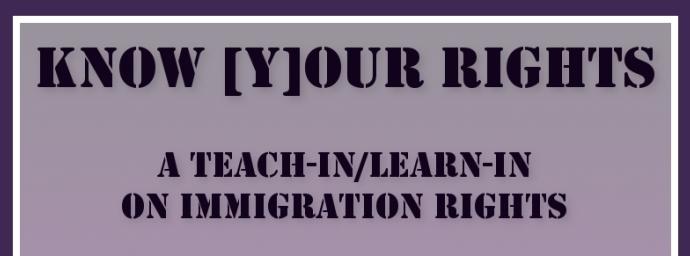Immigration in the Age of Trump: Columbia Holds “Know Your Rights” Community Gathering
Law professors, students, immigration attorneys, activists, government officials, and community members gathered Tuesday evening for Know [Y]our Rights: A Teach In/Learn In on Immigration Rights held at Columbia Law School. The speakers outlined specific rights, risks, concerns, resources, and advice for immigrants in the new uncertain age of President-elect Donald Trump, who made anti-immigrant rhetoric and policy a central part of his campaign.
“There are some people that are saying, ‘let’s calm everybody down,’” said Terry Lawson, director of the Family and Immigration Unit at Bronx Legal Services. “I’m not in that camp right now, I’m saying let’s remain hyper-alert and know what’s going on.”
The presentations were divided into three main topic areas: stay informed, use best practices, and exercise your rights, with role-play scenarios by Law School students intermingled throughout. The speakers focused on concrete guidance for those facing uncertainty about their immigration status in the coming months, including whether to renew Deferred Action for Childhood Arrivals (DACA), whether to file for citizenship, whether to report incidents to the police if they are undocumented, and what resources and services are available to New York City residents, regardless of immigration status. Each provided phone numbers and email addresses where attendees could follow up with further questions.
The Dec. 7 event was co-sponsored by the Law School and coordinated by Professors Rose Cuison Villazor, Elora Mukherjee and Jason Parkin, who each spoke at the teach-in.
Mukherjee, who directs Columbia Law School’s Immigrants’ Rights Clinic, described what individuals should do in the event that U.S. Immigration and Customs Enforcement (ICE) agents shows up at their door, noting that “It’s easier to give advice than to use it in person.” Each individual at the event received a red card from the Immigrant Legal Resource Center, outlining information for citizens and noncitizens to assert their rights--including not answering questions or handing over documents and not allowing ICE officials into the home unless they present a specific, valid warrant signed by a judge. Mukherjee said she has been advising every undocumented person she speaks to since the election to carry this card at all times.
“My advice is do not open the door to people that you do not know,” she said, noting that sometimes ICE raids are carried out under another pretext. “We are living in uncertain times, and under our new president we don’t know the scope of raids that he’s going to carry out.”
The two groups at risk of being deported are immigrants who don’t have legal status, and non-citizens who have criminal convictions, explained Bronx Defenders supervising immigration attorney Conor Gleason, who described the U.S. Citizenship and Immigration Services (USCIS) as the “happy” immigration arm of the Department of Homeland Security, and ICE as the “scary” arm. Non-citizens with criminal convictions are already at risk of removal under the current administration, but it is possible this could be expanded to those who have had any criminal justice contact under President-elect Trump, Gleason warned.
“When Trump talks about being harsh on immigration, it’s unclear what he means,” said Gleason, because ICE has already removed a record number of immigrants under President Obama.
Villazor explained Columbia University’s policies regarding DACA to students and others in attendance: the school supports the continuance of DACA, pledges to expand financial aid and other support if DACA is cancelled, will not allow immigration officials on campus without a warrant, and will not share a student’s undocumented status unless required by a subpoena.
Other speakers included Stephanie Park, an organizer at MinKwon Center for Community Action and a DACA recipient; Evelyn Garcia and Susana Pereyra, from the NYC Mayor's Office of Immigrant Affairs; Ryan Budhu, assistant corporation counsel for government policy at the New York City Law Department; Rex Chen, mentor attorney at the Safe Passage Project; and Trinh Tran, senior staff attorney at Sauti Yetu Center for African Women and Families.
The program was co-sponsored by New York Immigration Coalition, the NYC Mayor's Office of Immigrant Affairs, Bronx Defenders, Bronx Legal Services, MinKwon Center for Community Action, Sauti Yetu, Safe Passage Project, the Queer Detainee Empowerment Project, the Barnard Center for Research on Women, the Office of University Life at Columbia University, the Columbia Law School Latino/a Law Students Association, and the Society for Immigrant and Refugee Rights at Columbia Law School.
You can also view the video here.
# # #
Updated January 23, 2017
Posted December 8, 2016
